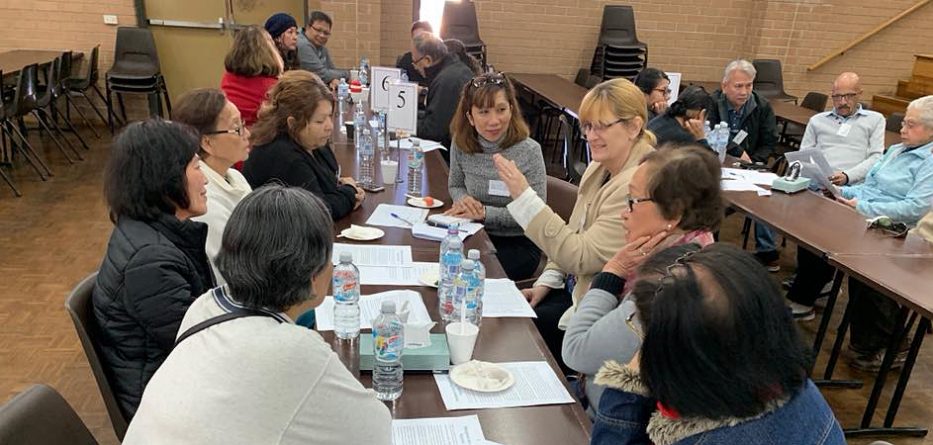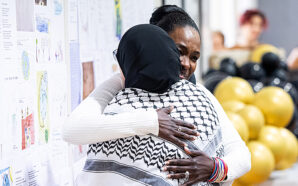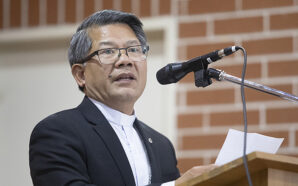“Walking with Refugees”, during this Refugee Week and beyond, first of all means listening to the stories that Refugees and People Seeking Protection have to tell. It means being moved by and learning from their lived experience.
A Table Talk is a conversation within a parish, school, organisation or local community with Refugees or People Seeking Protection in Australia. It is a powerful format that makes this listening and learning possible.
Related story: Walking with refugees
Related story: The Diocesan Food Drive: a simple way to support refugees
Related story: Walking with refugees in the Diocese of Parramatta: Refugee Week and beyond
Related story: Bishop Vincent Long’s story
Table Talks take between 90 minutes and 2.5 hours. They emphasise respectful dialogue and mutual sharing of personal stories: refugees or people seeking protection share their stories with the community. Participants from the hosting community are invited to share their own stories, too. The goal is to build solidarity, to find common ground in shared values, and build the capacity of communities to stand and walk with Refugees and People Seeking Protection.
Table Talks are also a good opportunity to explore questions and concerns that people may have regarding refugees and people seeking protection or asylum in a safe space and in a respectful way. Being caught in a state of uncertainty and insecurity, it is rare for refugees and people seeking protection to feel safe and secure enough to show the community who they really are. In the absence of their authentic voices, misleading information and mistruths have filled the void. The loudest voices are charged with scaremongering, fear and mistrust. Table Talks are a chance to change the conversation by engaging in dialogue with refugees and people seeking protection and listening to their stories.
The Diocesan Journey… Walking with Refugees and People Seeking Protection team can help you to organise a Table Talk, step by step. If your parish, school, organisation or local community is interested, please contact zoe.grant@jrs.org.au.
How Table Talks work in parishes
Read about a Table Talk with refugee Hava Rezale that was hosted by The Good Shepherd Parish, Plumpton.
Find out how the local community at Springwood engaged with refugee Kane Alkoraghooli.
You may have heard about similar formats with different names (e.g., Community Conversations, Changing the Conversation, Truth Be Told, or Refugee Voices). This simply depends on the agency which organises such an event with a local group. The scope and aim, however, are always the same. The “Diocesan Journey” team can assist you with finding the agency and format that suits your group best – including formats especially designed for schools.
If you decide to host a Table Talk, the Diocesan Journey team or one of their member agencies will organise:
- One or more people with a lived experience as a refugee/person seeking protection who are prepared to share their story during the talk.
- A suggested format for the conversation.
- An expert to respond to participants’ questions and reflections.
- Someone to facilitate or co-facilitate the talk with a local leader, if desired.
If you are hosting a group, you will be asked to:
- Provide a venue and time to gather for the Table Talk.
- Promote the Talk so people can register and attend.
- Meet at least twice beforehand and once afterwards with the organising agency to adapt the agenda to your community, their needs and values, and to hold a debriefing and follow up.
Sebastian Salaske-Lentern is the Peace, Justice and Ecology Coordinator of the Diocese of Parramatta.
This article highlights a story from the “Diocesan Journey… Walking with Refugees and People Seeking Protection”. Learn more about this initiative and follow our 14-week campaign from Refugee Week to World Day of Migrants and Refugees.








